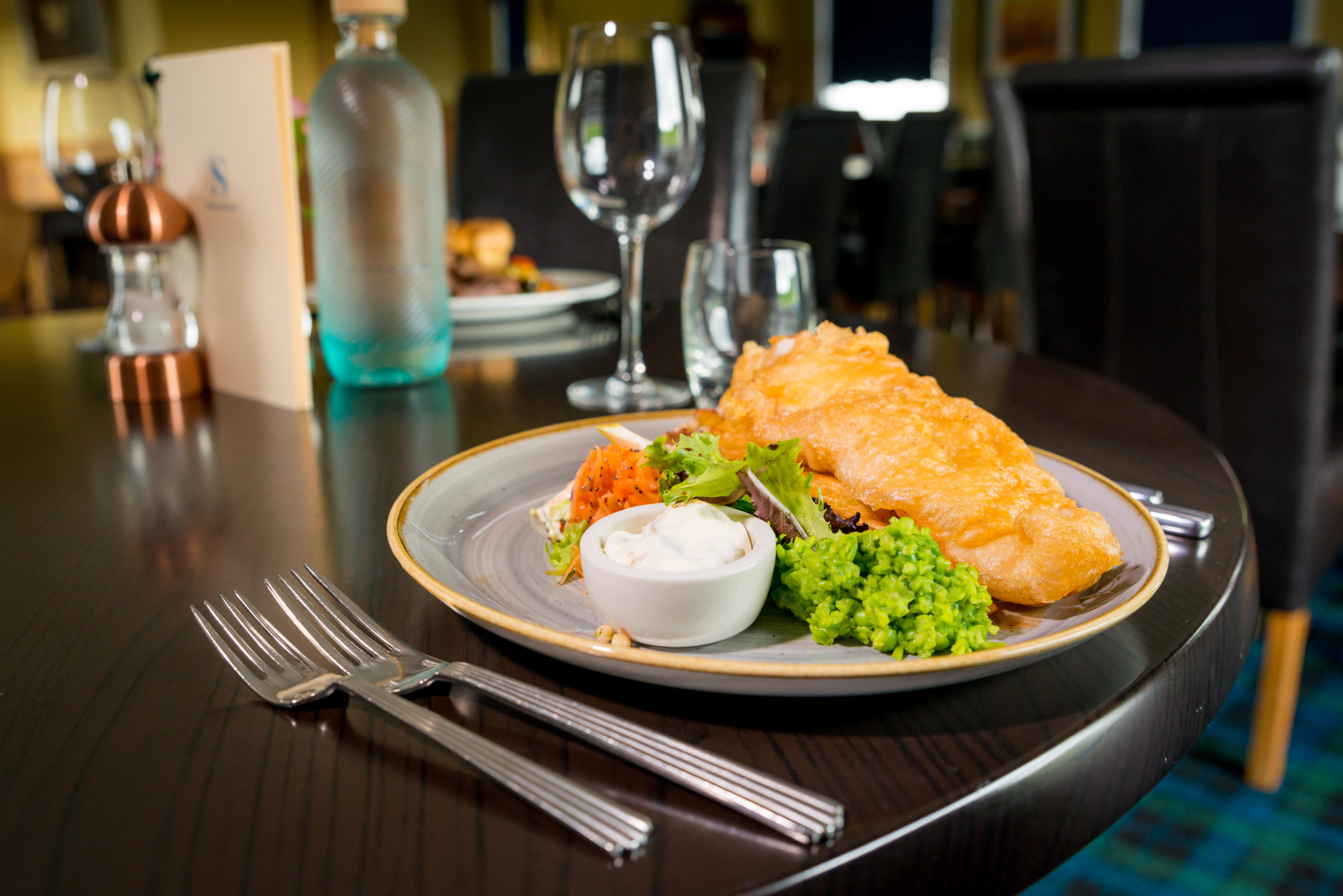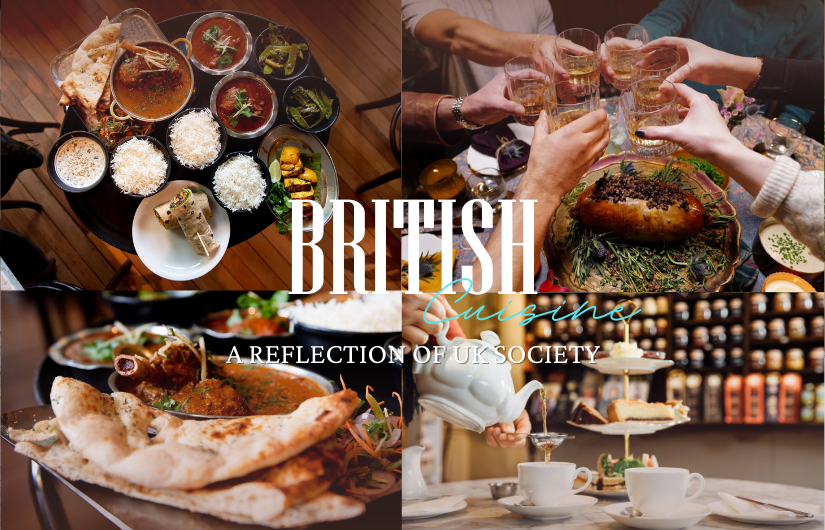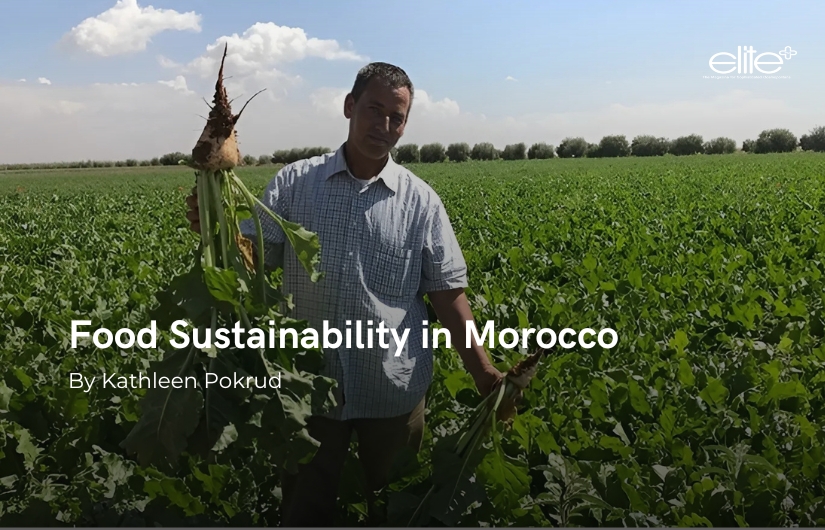British Cuisine: A reflection of UK Society
By Kathleen Pokrud
Britain has a rich history that spans centuries and has been influenced by different cultures and traditions. Food is rarely the first thing that comes to mind when thinking about Britain, but according to HE Ambassador Mark Gooding OBE, there is much more to British food than most people realise; more than fish and chips or the high tea. I was quite fortunate to have Ambassador Gooding lead me on s culinary journey of Britain, from its traditional dishes to modern innovations.
Ambassador Gooding kickstarted our discussion, saying, “The United Kingdom has been producing exceptional food and drink being served the world over U.K. food and beverage exports are now worth more than £20 billion. We deliver products that reflect our long-standing heritage while advancing towards a future of sustainable farming, with a focus on food safety and traceability. Our chefs are world-renowned and have been an integral part of our national identity.”
UK food: VisitBritain/Anastasia Ustenikova
On the subject of Britain's culinary story, Ambassador Gooding reflected, “It is safe to say that Britain's history has had a significant influence on our traditions, our culture and our cuisine. British cuisine has evolved in fascinating ways over the centuries, influenced by historical, cultural and societal factors. From the simplicity of medieval cuisine to the robust fusion foods of modern times.
Tikka Masala: VisitBritain/Nemorin
“The origins of British cuisine can be traced back to medieval times, when staples such as grains, meats and vegetables were the foundation of daily meals. Britain has always been a great trading nation, which brought new spices, especially saffron. The Tudor period saw the introduction of new ingredients from afar such as potatoes, tomatoes and even tea. The Industrial Revolution ushered in a trend towards convenient foods as urbanisation created a demand for quick meals, which possible led to the creation of our country's favourite takeaway: fish and chips.”

Saplin brae hotel: Discover Fraserburgh / Damian Shields”
Afternoon tea: VisitBritain
Geographically, United Kingdom consists of England, Scotland, Wales and Northern Ireland. Hence, British cuisine is not uniform; rather, it varies greatly by region. Ambassador Gooding highlighted, “Scotland's haggis and Scotch broth stand in stark contrast to the southwest's Cornish pasties and cream teas. Welsh rarebit is a national comfort food in Wales, and Ulster fry and soda bread are staple food in Northern Ireland. Each region has its own set of ingredients, recipes and culinary traditions, resulting in a vibrant tapestry of flavours that spans the four corners of the United Kingdom.”
Talking about modern cuisine in the UK, Ambassador Gooding explained, “Today's British food scene reflects the very fabric of our modern society - diversity. Almost every town in the UK has Chinese, Indian, Italian and Thai restaurants. Chicken Tikka Masala, a popular British dish, was influenced by South Asian delicacy. We are open and admire cuisines from all over the world. A prime example is the Thai chef, Chariya Khattiyot who recently won MasterChef UK 2023 with her Northern Thai dish, 'Khan Tok', after impressing the tough judges.”
Afternoon tea: VisitBritain/Aurelie Four/@lecorgi
He went on, “Food can always be improved with the right pairings. As Britain is home to major spirits companies, Scotch whisky is one of the most valuable exports from the UK and the world's most widely traded spirit. All fans of the famous Bond movies are familiar with the ‘shaken not stirred' martini made with British gin, which dates back to the 18th century. Gin distillers in the UK are creative, with ever-changing recipes and flavours ranging from pink grapefruit to earl grey tea. No one would be surprised to learn that Britain has a long history of wine production, with vines growing in the country since at least Roman times. English sparkling wine, with its light citrus and vanilla notes, pairs perfectly with delicate white fish, poultry and British game birds.”
Whiskey: VisitBritain/Aurelie Four/@lecorgi
London: VisitBritain/@whatwegandidnext
British farming is often considered to be at the cutting edge of modern agriculture, with the highest standards of food safety, sustainability and traceability. Ambastsador Gooding elaborated, “The landscape in the U.K. provides ideal conditions for producing high-quality beef and lamb, as well as plant-based meat alternatives. Britain is also recognised for its fresh seafood, which includes some of the world's best fish and shellfish. The UK food sector is thriving as it serves all dietary needs, thanks to our world-class science, innovation and creative sectors.
London Gin: VisitBritain/Sam Barker
“What distinguishes British cuisine is its ability to seamlessly combine tradition and innovation. While traditional dishes, like Shepherd’s pie and Beef Wellington, have long held a special place in our cuisine, modern British chefs are elevating these classics using cutting-edge techniques and global ingredients. The emphasis on seasonal, locally sourced produce demonstrates a commitment to freshness and sustainability. There can be no better place to demonstrate our modern gastronomy than in London. London, home to some of the world's best restaurants, serves as a melting pot of international cuisine, demonstrating the adaptability and openness of British palates.”
There are world-renowned British chefs such as Gordon Ramsey and Jamie Oliver. These household names are known around the world through their TV cooking shows, including in Thailand.
Tikka Masala: VisitBritain/Nemorin
Ambassador Gooding continued, “Their popularity reflects the British love of modern cooking techniques. Our chefs are also an integral part of our national identity, as demonstrated by the official menu for HM King Charles III's Coronation. The three dishes presented at the auspicious celebrations were Ken Hom's Coronation Roast Rack of Lamb with Asian-style Marinade, Nadiya Hussain's Coronation Aubergine and Adam Handling's Strawberry and Ginger Trifle, all of which reflect modern Britain's more diverse, vegetable-based food scene and return to local produce.”
As our interview drew to a close, Ambassador Gooding concluded, “It is fair to say that what we eat reflects who we are. The story of British cuisine is one of adaptability, integration and innovation. From humble beginnings in local agriculture to a plethora of spices and ingredients from being an epicentre of global trade, British gastronomy has evolved continuously. Its regional diversity and embrace of international influences all contribute to the distinctive and dynamic nature of British cuisine. If there is a short way of capturing British food, it is the ever-changing adaptation of a nation deeply rooted in its past while always looking forward to a more sustainable and responsible future.”
Credit Photo by:
617180 London: VisitBritain/@whatwegandidnext
616920 Afternoon tea: VisitBritain/Aurelie Four/@lecorgi
608861 Tikka Masala: VisitBritain/Nemorin
608773 Tikka Masala: VisitBritain/Nemorin
606799 UK food: VisitBritain/Anastasia Ustenikova
606287 London Gin: VisitBritain/Sam Barker
604122 Afternoon tea: VisitBritain
617017 Whiskey: VisitBritain/Aurelie Four/@lecorgi
Saplin brae hotel: Discover Fraserburgh / Damian Shields
Burns supper (Royalty free)
Welsh rarebit: Crown Property
Tracey’s Farmhouse: Crown Property
Saplin brae hotel: Discover Fraserburgh / Damian Shields














































































































































































































































































































































































































































































































































































































































































































































































































